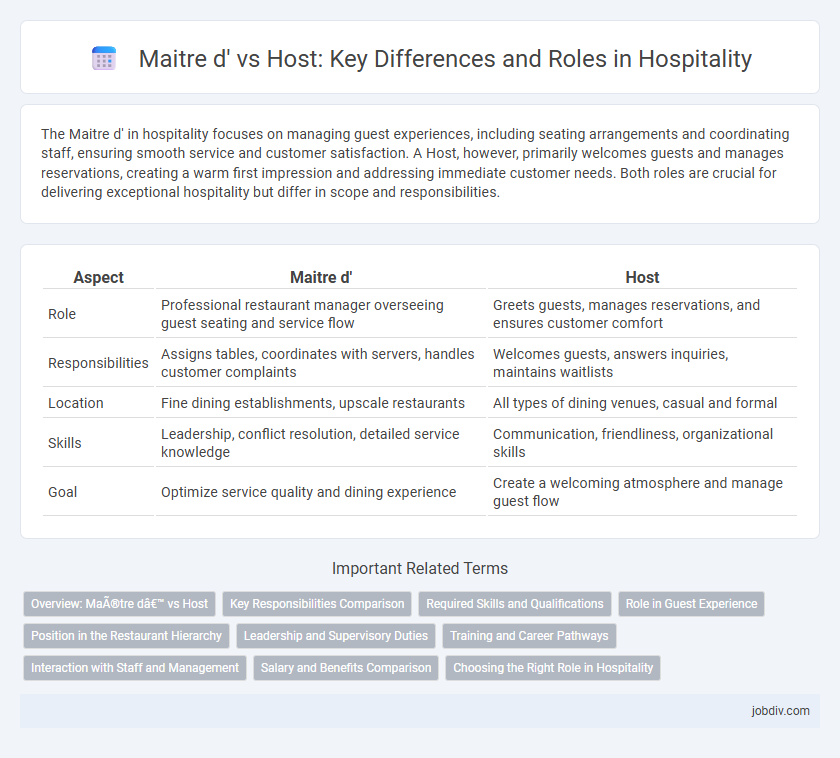The Maitre d' in hospitality focuses on managing guest experiences, including seating arrangements and coordinating staff, ensuring smooth service and customer satisfaction. A Host, however, primarily welcomes guests and manages reservations, creating a warm first impression and addressing immediate customer needs. Both roles are crucial for delivering exceptional hospitality but differ in scope and responsibilities.
Table of Comparison
| Aspect | Maitre d' | Host |
|---|---|---|
| Role | Professional restaurant manager overseeing guest seating and service flow | Greets guests, manages reservations, and ensures customer comfort |
| Responsibilities | Assigns tables, coordinates with servers, handles customer complaints | Welcomes guests, answers inquiries, maintains waitlists |
| Location | Fine dining establishments, upscale restaurants | All types of dining venues, casual and formal |
| Skills | Leadership, conflict resolution, detailed service knowledge | Communication, friendliness, organizational skills |
| Goal | Optimize service quality and dining experience | Create a welcoming atmosphere and manage guest flow |
Overview: Maître d’ vs Host
The Maitre d' is a formal dining professional responsible for managing reservations, greeting guests, and overseeing the dining room to ensure seamless service in upscale hospitality venues. The Host primarily welcomes guests upon arrival, manages waitlists, and directs them to their tables, often in casual or fast-paced restaurant settings. Both roles emphasize guest experience but differ in scope, with the Maitre d' having broader managerial duties and a higher focus on service coordination.
Key Responsibilities Comparison
The Maitre d' oversees the dining room operations, manages reservations, coordinates staff schedules, and ensures high-quality guest service in upscale restaurants. The Host primarily greets guests, manages waitlists, and handles seating arrangements to optimize table turnover and guest flow. Both roles require strong interpersonal skills but differ in scope, with the Maitre d' carrying broader managerial duties and the Host focusing on front-of-house guest interactions.
Required Skills and Qualifications
A Maitre d' requires advanced hospitality skills, including exceptional customer service, staff management, and a thorough understanding of fine dining etiquette, often backed by formal training or extensive restaurant experience. A Host focuses on strong interpersonal communication, organizational abilities, and maintaining an inviting atmosphere, typically requiring customer service experience and a friendly demeanor. Both roles demand excellent problem-solving capabilities and the ability to manage guest interactions efficiently.
Role in Guest Experience
The Maitre d' orchestrates the dining room's flow, ensuring seamless seating arrangements and attentiveness that elevates the guest experience through personalized service and attention to detail. The host primarily manages guest arrival and initial seating, creating a welcoming first impression that sets the tone for the meal. Both roles contribute crucially to hospitality, but the Maitre d' drives ongoing engagement, while the host focuses on smooth transitions and immediate guest comfort.
Position in the Restaurant Hierarchy
The Maitre d' holds a senior position in the restaurant hierarchy, responsible for overseeing the dining room, managing reservations, and ensuring seamless service coordination. The Host typically occupies an entry-level role focused on greeting guests, managing waitlists, and facilitating seating arrangements. While both roles directly interact with customers, the Maitre d' exercises greater authority in operational decisions and staff supervision.
Leadership and Supervisory Duties
The Maitre d' leads front-of-house operations, ensuring seamless coordination between kitchen and service staff to uphold dining standards and guest satisfaction. Supervisory duties include managing reservation systems, training waitstaff, and resolving customer issues with authority and diplomacy. Hosts primarily focus on greeting guests and managing seating, while the Maitre d' assumes comprehensive leadership responsibilities that drive operational efficiency and team performance.
Training and Career Pathways
Maitre d' professionals undergo specialized training in fine dining service, table management, and interpersonal communication, which prepares them for supervisory roles within upscale restaurants and hotels. Hosts typically receive foundational customer service training focused on guest greeting and reservation management, serving as entry points to roles in front-of-house operations. Career pathways for Maitre d' often lead to restaurant management or hospitality executive positions, while hosts can advance to maitre d', event coordination, or guest relations management through progressive experience and training.
Interaction with Staff and Management
The Maitre d' serves as a critical liaison between the kitchen staff, waitstaff, and management, ensuring seamless communication and efficient service flow in upscale dining establishments. Unlike the Host, who primarily manages guest seating and initial greetings, the Maitre d' actively supervises staff performance and coordinates with management to maintain service standards and resolve any operational issues. This role requires strong leadership and interpersonal skills to foster teamwork and uphold the restaurant's reputation for exceptional hospitality.
Salary and Benefits Comparison
Maitre d' roles typically command higher salaries due to their specialized training and responsibility for managing dining room operations, often ranging from $40,000 to $60,000 annually. Hosts usually earn between $25,000 and $35,000, reflecting entry-level status with primary duties in guest greeting and seating. Benefits for Maitres d' often include performance bonuses, health insurance, and paid time off, whereas hosts might receive more limited perks, emphasizing the disparity in compensation and job scope within hospitality front-of-house positions.
Choosing the Right Role in Hospitality
Choosing between a Maitre d' and a Host in hospitality hinges on the specific needs of the establishment and guest experience priorities. The Maitre d' typically oversees restaurant operations, ensuring seamless service coordination and personalized guest interactions, while the Host primarily manages seating logistics and initial guest reception. Understanding these distinct roles helps optimize staff allocation, enhance customer satisfaction, and streamline front-of-house efficiency.
Maître d' vs Host Infographic

 jobdiv.com
jobdiv.com